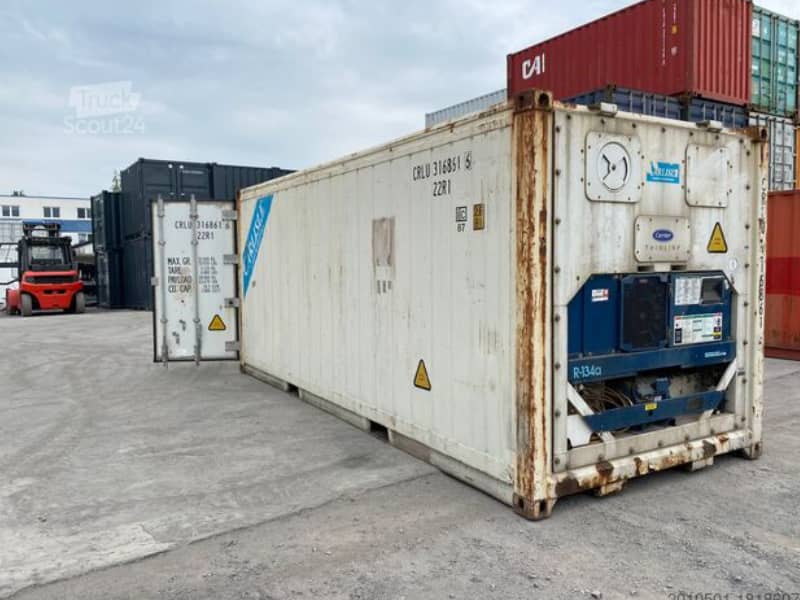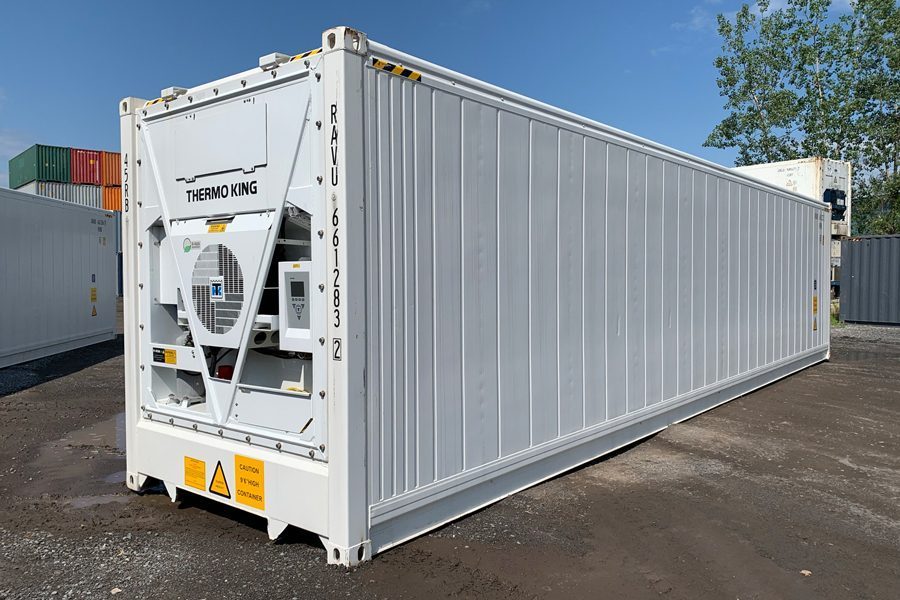Everything About Cold Store Containers: Vital Insights for Your Storage Needs
Cold store containers play an essential function in the preservation of disposable goods. They come in numerous forms, consisting of chilled and protected units, each made for details storage needs. Comprehending the advantages and crucial functions of these containers is vital for businesses aiming to maximize their procedures. As the demand for reliable storage options grows, discovering the different alternatives available can cause informed choices that impact both earnings and sustainability. What factors should one take into consideration when choosing the right container?
Sorts Of Cold Store Containers
Cold store containers can be found in various types, each designed to satisfy details temperature level control needs. Among the most typical kinds are chilled containers, which keep temperatures in between 0 ° C to 10 ° C, making them ideal for perishable goods like fruits, vegetables, and milk products. An additional type is the deep freezer container, which runs at temperatures below -18 ° C, suitable for long-lasting storage space of icy things such as meats and fish and shellfish.
Protected containers give temperature level security without energetic air conditioning, making them beneficial for temporary transportation of temperature-sensitive items. Furthermore, there are portable cold store systems, which supply versatility in places and are often utilized in occasions or seasonal procedures. Lastly, blast refrigerators quickly minimize the temperature of hot foods, ensuring safety and quality. Each type offers an one-of-a-kind objective in numerous industries, from food solution to pharmaceuticals, emphasizing the relevance of picking the ideal container for particular storage requirements.

Advantages of Utilizing Cold Storage Solutions

Moreover, cold store solutions expand the rack life of items, lowering waste and increasing earnings for organizations. By effectively managing supply with appropriate temperature level control, companies can enhance their supply chains and enhance functional performance.
Furthermore, cold store centers permit versatile storage alternatives, accommodating different quantity needs and seasonal variations popular (used 40ft refrigerated shipping containers). This flexibility helps organizations respond promptly to market changes
Utilizing cool storage space solutions can ensure conformity with wellness and security laws, safeguarding both consumers and services. On the whole, the strategic use of cold store boosts product management while promoting sustainability and economic viability.
Secret Functions to Try To Find in Freezer Containers
When picking chilly storage space containers, several key features value mindful factor to consider to secure peak performance and integrity. First, temperature control capabilities are vital; containers must preserve constant temperatures suitable for specific goods. Insulation quality also plays a considerable function, as remarkable insulation minimizes energy intake and improves temperature security.
Next, ease of accessibility and loading is critical; containers should supply straightforward styles for efficient handling and organization. Toughness is one more essential facet; weather-resistant products ensure durability and secure contents versus environmental elements.
Additionally, flexibility functions, such as integrated wheels or raising factors, assist in transport, while personalized formats enable for customized storage remedies.
Checking systems, including temperature level alarm systems and remote monitoring, supply real-time updates, making certain that conditions remain excellent. By concentrating on these attributes, individuals can pick cold store containers that satisfy their functional demands effectively.
Choosing the Right Freezer Container for Your Requirements
Picking the best cold store container calls for a thoughtful assessment of certain demands and operational demands. Factors such as the type of items being stored, temperature sensitivity, and quantity should be prioritized. For example, perishable food items may require containers with rigid temperature controls, while pharmaceuticals may need precise conditions to preserve effectiveness.
Additionally, potential users ought to take into consideration the container's size and flexibility. A larger system might be necessary for mass storage space, while smaller sized, portable options can be suitable for on-site or momentary demands. Insulation top quality and energy efficiency are also critical, as these will influence functional prices and temperature level security.
Conformity with market policies and standards is essential, specifically in markets like food and health care. By very carefully examining these aspects, customers can pick a chilly storage container that properly satisfies their distinct requirements and guarantees optimum storage problems.
Finest Practices for Maintaining Freezer Issues
Maintaining ideal cold store problems is crucial for protecting the high quality and security of temperature-sensitive items. Routinely keeping an eye on temperature and moisture levels is important; utilizing reliable electronic thermometers and hygrometers can supply accurate analyses. Moreover, correct insulation of freezer containers assists reduce temperature level variations and power loss.
Implementing a first-in, first-out (FIFO) system assures that older stock is Extra resources used prior to newer stock, decreasing waste (used 40ft refrigerated shipping containers). In addition, maintaining an organized format within the storage space permits much better airflow and minimizes the threat of cross-contamination
Regular maintenance examine tools, such as compressors and seals, are essential to avoid breakdowns. Team training on finest practices for loading and discharging products helps maintain temperature level integrity. Finally, keeping doors closed as high as feasible limitations heat exchange, guaranteeing that the cool storage atmosphere remains secure and reliable in maintaining valuable items.
Expense Factors To Consider for Freezer Solutions
When assessing cool storage remedies, it is vital to think about the initial investment expenses together with ongoing operational expenditures. A comprehensive failure of these expenses can expose considerable long-lasting savings possibility for organizations. Understanding these financial facets assists stakeholders make informed choices concerning their cold storage space requirements.

Initial Investment Prices
The economic landscape of cool storage containers offers numerous first investment costs that organizations should consider. These expenses commonly consist of the acquisition or rental rate of the containers, which can differ based upon insulation, type, and size top quality. In addition, expenditures related to retrofitting existing structures to suit cold store must be factored in, particularly if specialized devices is required. Installation prices, including electrical job and refrigeration systems, likewise add to the total preliminary investment. Businesses ought to not neglect transportation prices for providing containers to their desired place. Possible modification alternatives, such read review as shelving or temperature surveillance systems, can additionally impact the preliminary economic outlay. Mindful budgeting for these elements is essential for effective cold store execution.
Operational Expenditures Break Down
Functional costs for cold store solutions include numerous vital cost factors to consider that companies have to navigate. Secret variables consist of energy expenses, which can be significant due to the need to maintain reduced temperature levels. Maintenance expenditures are additionally significant, as normal servicing is important to guarantee devices runs successfully and continues to be compliant with health and security criteria. In addition, labor costs might develop from the requirement for specialized team to manage and keep an eye on the storage space setting. Insurance expenses are another consideration, as business have to shield their financial investments against potential losses. Any type of possible governing conformity costs should be factored in, as services may need to spend in systems that stick to food safety and security and ecological laws. Recognizing these expenditures is critical for reliable budgeting.
Long-Term Financial Savings Possible
Purchasing cold storage options uses considerable long-lasting savings potential, changing initial expenses right into monetary efficiency with time. By reducing putridity and waste, businesses can boost their revenue margins considerably. Advanced insulation and energy-efficient systems lower utility prices, which collect over the life expectancy of the equipment. In addition, chilly storage space containers commonly need much less regular maintenance contrasted to traditional refrigeration approaches, resulting in reduced repair service expenses. The capability to shop products for prolonged durations without jeopardizing top quality enables companies to maximize market variations, maximizing income. Furthermore, the scalability of freezer solutions enables firms to adapt to transforming demands without sustaining excessive expenses. Overall, these variables contribute to an engaging case for cold store as a cost-efficient financial investment method.
Often Asked Inquiries
The Length Of Time Can Food Be Kept in Freezer Containers?
The duration food can be saved in cold store containers differs by type. Normally, disposable products last from days to weeks, while frozen foods can stay safe for months, depending on appropriate temperature level and storage space problems.
Are Freezer Containers Energy-saving?
The power performance of cold storage space containers varies based on style and insulation top quality. Modern systems typically make use of innovative innovation to minimize energy consumption, eventually adding to decreased operational expenses and environmental influence in long-term use.
Can Cold Storage Containers Be Custom-made for Specific Needs?
Cold store containers can undoubtedly be tailored to meet certain requirements. Adjustments might include temperature controls, size adjustments, and added functions, permitting customers to customize services efficiently for different storage space needs and functional preferences.
What Are the Common Sizes of Freezer Containers?
Cold store containers typically are available in typical dimensions such as 10, 20, and 40 feet. These dimensions accommodate various storage space requirements, guaranteeing flexibility for companies requiring temperature-controlled atmospheres for delicate products or disposable products.
Do Cold Storage Containers Require Special Authorizations for Usage?
Freezer containers typically require unique licenses for usage, depending upon local guidelines and intended applications. Authorities may mandate permits to assure safety criteria, environmental conformity, and correct operational techniques are preserved throughout their usage.
Cold storage space containers come in various kinds, each designed to fulfill particular temperature level control requirements. Furthermore, cold storage centers allow for adaptable storage options, suiting different quantity needs and seasonal changes in need. Choosing the ideal cold original site storage container requires a thoughtful assessment of operational demands and specific demands. The monetary landscape of chilly storage space containers offers various preliminary investment prices that services have to consider. Cold storage containers can undoubtedly be personalized to fulfill details needs.